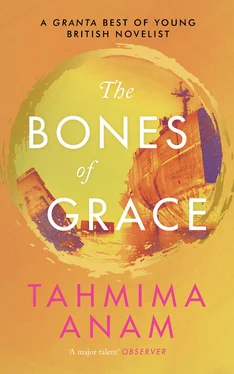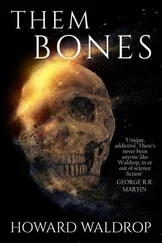‘My sister’s daughter is my daughter.’ I looked at the three people who were the closest in the world to me. Holding my hand. Blowing prayers over my face. Whispering tender words into my ears. My sister was a prostitute because Anwar had abandoned her to build a skyscraper in Dubai and she had nowhere to go and when she had died, her daughter had been sold and Mo had tried to rescue her and now here this girl was, hiding behind her father’s legs, the father who had abandoned her mother, my sister, the woman with my face who had died of a broken heart.
Dolly, who had pointed out the ugliness of my history, had no idea how ugly it really was.
‘My sister’s daughter is my daughter,’ I repeated.
Rashid said: ‘She could be anyone.’
‘No.’ I shook my head. ‘She’s mine. Can’t you see?’ I closed my eyes and pictured the girl, who had finally emerged from behind her father and stood by my bedside in a cheap blue dress. Through the pain on the side of my head and the ache in my arm and the unbearable pain of waking up and finding that you were not at my bedside, I experienced a sweet, unpunctuated joy. I know who I am now, Elijah. I saw it the moment I looked into her face. I am her, and she is me. The restless being is at peace at last. Rumi said: look inside yourself; everything that you want, you are already that.
‘I want to take her home,’ I said. We were alone; my parents had quietly left the room as I had expressed my demand and Rashid his reservations.
‘She has a father,’ Rashid said. ‘She belongs with him.’
‘No,’ I argued. ‘She’s mine.’
Anwar had given the girl to me. He had brought her to me and said that she should come home with us, because he had nothing and we would give her a life. Ammoo and Abboo had looked at each other, Bibles of words passing silently between them, and nodded. Only Rashid pointed out how strange this would make our family.
‘I’ve decided,’ I said.
Rashid had not left my bedside since the accident, and the strain was showing, the lower half of his face obscured by stubble. ‘Wait till you’re better,’ he said, lightly caressing the small strip of my skin between my hairline and the bandage. They had shaved my head there, I knew, and put in seventeen stitches.
‘She looks like me,’ I said.
‘I hadn’t noticed,’ he said, his hand resting on my shoulder, running the soft pad of his thumb along my collarbone.
‘You wanted to be a father.’
‘Yes, to our child.’
‘This can be our child.’
He folded his hands on his lap and looked up at the murmuring light of the fluorescent bulb. A nurse entered and checked the level of fluid in my drip. We waited until the adjustment had been made, one bag exchanged for another.
Finally, he said, ‘Zee, it’s too much randomness.’
‘Take it or leave it,’ I said, refusing to make my case. ‘She comes with me.’
And he said, ‘I choose you, Zee, but you can’t expect me to take a stranger into my house. My parents wouldn’t have it.’
In that moment, I was free of him. There was no turning back from this: his declaration of her as a stranger was also an objection to me, to the randomness of me. It wasn’t that I couldn’t love a man who wouldn’t take this girl into his heart, but that he was making it clear he could only love the piece of me he could imagine, the piece he could know. The mystery of me, my alienness, would always be at best obscured, something to ferret away in shame.
Perhaps it was already too late for Rashid and me — too late the moment I met you, Elijah. And I should be sorry, perhaps, that this is what it took for me to see that Rashid and I could never be together. But if you are reading this, if I have done my job, you will know that it was never going to be enough that I loved you. It would have to be that the whole rotation of the world, my world, shifted ever so slightly, so that everything that seemed acceptable, everything that seemed inevitable, would suddenly become loathsome to me. And that is what happened. A bruise on the forehead. A bruise on the brain. A fallen girl who was my girl, my other, bearing the weight of all the missing fragments of my history.
Ambulocetus was not alone in her day. She had contemporaries: Takracetus, Gaviocetus, Dalanistes — each of these may have been the ancestor of the whale as we know it. Or it could have been another altogether, a genus yet to be discovered. What we do know is that the whale was first a coyote, then a water-curious amphibian, and, finally, the creature that would rule the seas and become the stuff of our myths, our ocean-totems, our outstanding beast, the one who reminds us that long before our time, beings were made on a grander scale, their bones as big as cities. The whale is the fragment of that grandeur, of life writ on a canvas so large it is almost beyond the imagination. And for this to have happened, a transgression had to be committed, an abandonment of limbs, an adventure into water, and the courage to bid farewell to the past, whatever such voyaging may have cost, whatever longings and loves were left behind in the rubble.
Shona and Abboo and Ammoo and I went home together, the four of us a mottled tribe. I said goodbye to Rashid at the hospital. I was hollowed out, numb from all that had happened, so I told him with a dead voice that it was over and he gave me a look of disbelief — it made him feel better, I think, to assume I’d taken leave of my senses. I saw him a few times after that, but we had less and less to say to each other, and finally, about a year later, in front of the same Kazi who had married us, we signed our names again in the black register and were divorced.
Those first weeks with Shona were the hardest. I thought she would cry, that she would ask for Mo, or her father, or someone from her past, but she didn’t speak a word to us on the long ride home, all the way down the Dhaka— Chittagong highway, through the city, and past the gates of the apartment building and up the elevator. When we entered, she only gave a small hint of the vast distance between this place and all the other places she had called home by pulling at her eyelashes, a gesture I would come to know as one that conveyed extreme distress. Ammoo took over the care of her. She knew, instinctively, what to do, putting Shona in the bed with her and making sure the rest of us kept our distance, especially Abboo. In the morning we found them curled around each other like human and cat. A strand of Ammoo’s hair was in Shona’s fist. I was desperate to question her about Mo, to ask where she had met him and how they had come to be in that crate together, but she could barely look at me, her eyes perpetually sweeping the mosaic floor.
Eventually we took her to see a doctor, and there were injuries, ones that pre-dated the accident, that would take their time to heal. It would be impossible for me to accurately describe the recriminations that we all silently carried with us from the moment Shona arrived, all the guilt, responsibility, self-hating that we experienced as we wondered about her life. Shona told us nothing about her mother. She sat at the table and refused to eat. She wet the bed again and again. We made the mistake of putting her in school, believing the company of other children might do her some good, but she was sent home after the first week, having spat at the teacher and punched another girl.
I had to confront, again, the fact that I would never know anything about my mother. I searched in Shona’s face for a sign of myself, and I saw that her lips, the particular angle of them when she was angry, or smiled (rare, that), mimicked my own, and her incisors, like mine, were sharp and slightly crooked. Aside from that, she gave away nothing, said nothing.
Читать дальше












